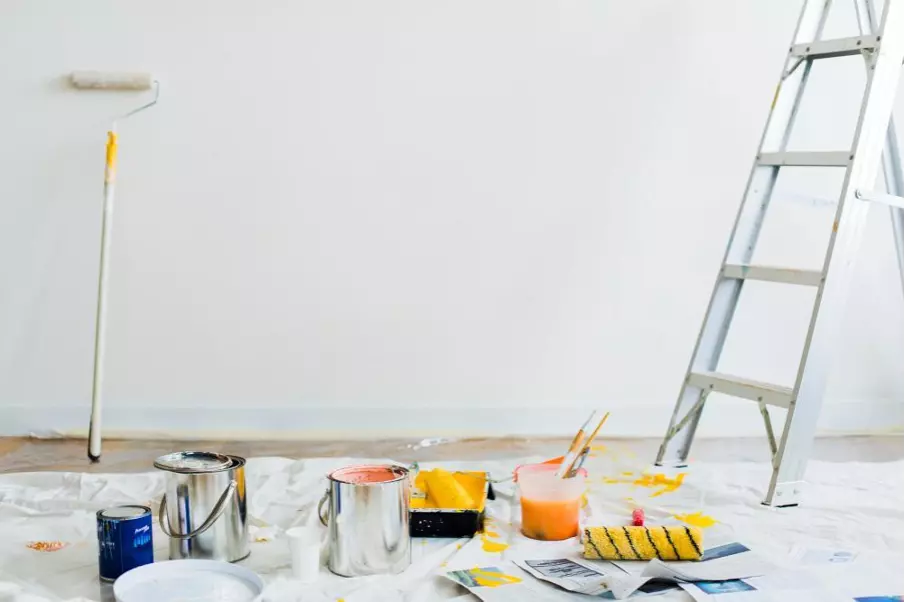A Beginner’s Guide to Renovating a House

Renovating is one of the best things you can do for your home, especially if you’re an interior freak, but it can be difficult to know where to start. At the same time, renovating can cost a lot, but if done right, it can make all the difference for your property.
Although tackling your home is exciting and rewarding, it does have its challenges. Luckily, you have our guide to ensure you have an effortless renovation project that’s worth every penny.
What Are the Advantages and Disadvantages of Renovating?
New home buyers are constantly seeking ways to renovate their houses and money doesn’t seem to be a concern. In fact, statistics show that newer owners invested around $30,000 in renovations.
Perhaps one of the main reasons for this is the exciting potential that renovation provides to a new homeowner, which often results in a successful project with an uplift in value. That said, one of the many advantages is that a house renovation, regardless of the amount of money that you spend on it, may increase its value in the market.
Conversely, there are some disadvantages. For example, if the project drains your funds and you end up with an unsuccessful renovation, there’s the risk that you’ll spend your budget and be left with nothing in the end.
That’s why you need to have the right knowledge to ensure you end up with your dream project. This beginner’s guide will break down the main stages of a renovation for a smooth project and no issues in the long run.
Finding a Home with a Renovation Potential
Sometimes, some houses have no renovation potential, regardless of how much you try to find one. As a beginner, your first and most crucial part of a successful renovation is to find a property with proper renovation potential. However, this step can be challenging, such to poor insulation, unidentified damage, or hidden costs.
When examining the property, ensure to look at the layout and whether you’ll need to reconsider the structure of the home’s floor plan. If you want to create large spaces, you’ll need strong structural reinforcement.
You should also understand your home’s construction and the materials that have been used as they will impact your renovation costs. For example, if the house has solid walls and you want to upgrade its thermal performance, this may be a harder task because it’ll require either external or internal insulation to prevent dampness or moisture.
Consider Budget and Finance
Once you have a clear understanding of your home’s structure and renovation potential, it’s time to get on with the next most essential step – the budget. The cost of your renovation will depend on many factors but you need to calculate a realistic budget. Your initial goal is to spend less money on the renovation part than the estimated value of the entire house, meaning the costs shouldn’t outdo the price of the property.
Depending on the size and type of your house, you can expect to pay around $10 to $150 per square foot. If you want to make this an easier process, you can build a budget for every room. Additionally, the average cost to renovate certain rooms is:
- Bathroom: $3,000-$25,000
- Living room: $5,000-10,000
- Kitchen: $6,000
- Master bedroom: $10,000-$15,000
- Home office: $5,000
As a rule of thumb, you shouldn’t spend over 10 to 15 percent of your property’s value for one room. For example, if your house is worth around $100,000, you should spend no more than $15,000 on renovation for a kitchen or bathroom.
When you’re considering the budget for the entire renovation project, there are also some minor costs that shouldn’t go unnoticed. There is a lot of decluttering you should do, especially since you’re most likely changing furniture or getting rid of other things.
In that case, it’s expected to have plenty of trash outside your house. If you want to know how to handle the waste, it’s best to hire a decluttering company to handle all the work so you don’t deal with that extra workload.
Consider Planning Permission
A beginner hunting for a house to buy must consider plenty of factors and planning permission is one of them. Some areas of your renovation require special permits, such as:
- Demolition
- Re-roofing
- Structural changes
- HVAC work
Before carrying on with your renovation plans, you must check with your city or town whether you’re eligible to make any upgrades to your house.
Create a Design
If you want to DIY your house renovation, it’s worth taking your time to design the perfect interior or exterior. Think about the changes you’re trying to make and if they’ll work with your property. Ask yourself questions if you want to restore or transform your home entirely.
You must think about room placement too. Do you want to bring natural light in or do you want to arrange the rooms in a way you can spend most of your time there? If you’re feeling unsure about your decision, you could also consult with a designer to consider all the possibilities
More to Read:
Previous Posts:











